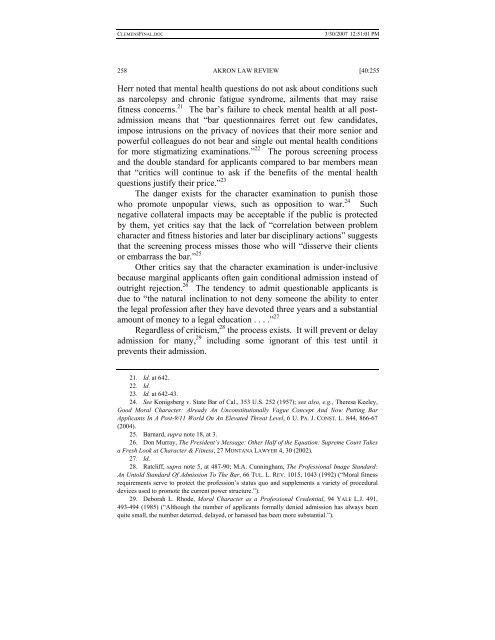Facing the Klieg Lights: Understanding the "Good Moral Character"
Facing the Klieg Lights: Understanding the "Good Moral Character"
Facing the Klieg Lights: Understanding the "Good Moral Character"
Create successful ePaper yourself
Turn your PDF publications into a flip-book with our unique Google optimized e-Paper software.
CLEMENSFINAL.DOC<br />
3/30/2007 12:51:01 PM<br />
258 AKRON LAW REVIEW [40:255<br />
Herr noted that mental health questions do not ask about conditions such<br />
as narcolepsy and chronic fatigue syndrome, ailments that may raise<br />
fitness concerns. 21 The bar’s failure to check mental health at all postadmission<br />
means that “bar questionnaires ferret out few candidates,<br />
impose intrusions on <strong>the</strong> privacy of novices that <strong>the</strong>ir more senior and<br />
powerful colleagues do not bear and single out mental health conditions<br />
for more stigmatizing examinations.” 22 The porous screening process<br />
and <strong>the</strong> double standard for applicants compared to bar members mean<br />
that “critics will continue to ask if <strong>the</strong> benefits of <strong>the</strong> mental health<br />
questions justify <strong>the</strong>ir price.” 23<br />
The danger exists for <strong>the</strong> character examination to punish those<br />
who promote unpopular views, such as opposition to war. 24 Such<br />
negative collateral impacts may be acceptable if <strong>the</strong> public is protected<br />
by <strong>the</strong>m, yet critics say that <strong>the</strong> lack of “correlation between problem<br />
character and fitness histories and later bar disciplinary actions” suggests<br />
that <strong>the</strong> screening process misses those who will “disserve <strong>the</strong>ir clients<br />
or embarrass <strong>the</strong> bar.” 25<br />
O<strong>the</strong>r critics say that <strong>the</strong> character examination is under-inclusive<br />
because marginal applicants often gain conditional admission instead of<br />
outright rejection. 26 The tendency to admit questionable applicants is<br />
due to “<strong>the</strong> natural inclination to not deny someone <strong>the</strong> ability to enter<br />
<strong>the</strong> legal profession after <strong>the</strong>y have devoted three years and a substantial<br />
amount of money to a legal education . . . .” 27<br />
Regardless of criticism, 28 <strong>the</strong> process exists. It will prevent or delay<br />
admission for many, 29 including some ignorant of this test until it<br />
prevents <strong>the</strong>ir admission.<br />
21. Id. at 642.<br />
22. Id.<br />
23. Id. at 642-43.<br />
24. See Konigsberg v. State Bar of Cal., 353 U.S. 252 (1957); see also, e.g., Theresa Keeley,<br />
<strong>Good</strong> <strong>Moral</strong> Character: Already An Unconstitutionally Vague Concept And Now Putting Bar<br />
Applicants In A Post-9/11 World On An Elevated Threat Level, 6 U. PA. J. CONST. L. 844, 866-67<br />
(2004).<br />
25. Barnard, supra note 18, at 3.<br />
26. Don Murray, The President’s Message: O<strong>the</strong>r Half of <strong>the</strong> Equation: Supreme Court Takes<br />
a Fresh Look at Character & Fitness, 27 MONTANA LAWYER 4, 30 (2002).<br />
27. Id.<br />
28. Ratcliff, supra note 5, at 487-90; M.A. Cunningham, The Professional Image Standard:<br />
An Untold Standard Of Admission To The Bar, 66 TUL. L. REV. 1015, 1043 (1992) (“<strong>Moral</strong> fitness<br />
requirements serve to protect <strong>the</strong> profession’s status quo and supplements a variety of procedural<br />
devices used to promote <strong>the</strong> current power structure.”).<br />
29. Deborah L. Rhode, <strong>Moral</strong> Character as a Professional Credential, 94 YALE L.J. 491,<br />
493-494 (1985) (“Although <strong>the</strong> number of applicants formally denied admission has always been<br />
quite small, <strong>the</strong> number deterred, delayed, or harassed has been more substantial.”).
















